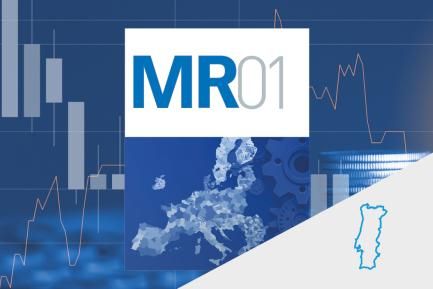Portugal: the economy continues its way towards pre-pandemic levels
Growth exceeds expectations in Q3
GDP grew by 2.9% quarter-on-quarter and 4.2% year-on-year, narrowing the gap compared to the pre-pandemic level to 3.1%. This growth has been stronger than that anticipated by CaixaBank Research, and calls into question the current 4% forecast for GDP growth in 2021, suggesting the need for a possible upward revision. In turn, the indicators available for Q4, while still scarce, point towards a steady pace of recovery. In the first 20 days of October, the daily economic activity indicator continues to suggest growth in economic activity of around 3% year-on-year. In addition, the economic climate indicator rose in October, reaching its highest value since the beginning of the pandemic. The outlook for 2022 is positive. Progress in the control of the disease, a favourable financial environment and an expansive budgetary policy are the main reasons why growth is expected to remain above its potential (between 0.5% and 0.6% quarterly). Despite this, there are risk factors, such as those related to the shortage of supplies and the evolution of the pandemic itself. The political instability generated following the parliamentary rejection of the 2022 budget proposal also poses a risk, insofar as it could limit the receipt of European funds, dent confidence and lead to the postponement of investment decisions.
The labour market continues to recover
Employment now exceeds pre-pandemic levels (+34,700 jobs in August compared to August 2019) and the unemployment rate has fallen to 6.4%. Registered unemployment continues to decline, although it remains above pre-COVID levels (+57,800 people unemployed). Nevertheless, there is an increase in unfilled job vacancies, with the figure standing at 23,800 in September (+26% compared to pre-pandemic levels). This rise is driven by certain sectors, such as construction, accommodation and catering, retail, real estate, administrative activities, public administration and health activities. Some of these sectors, especially accommodation, catering and retail, may have been adversely affected by the flight of workers to other sectors that have been less affected by the pandemic. In addition, COVID-19 has affected international mobility, which may have reduced the number of immigrants. With regard to construction, the increase in investment and the labour shortage have also influenced the increase in vacancies.
No signs of slowdown in the real estate market
In Q3 there were 48,770 home sales according to Confidencial Imobiliário, representing 1,346 less than in Q2 but 1,765 more than in Q4 2019. In the same period, the price indices registered year-on-year increases in excess of 9%. This market buoyancy appears to be justified by the favourable global financial environment, with ample liquidity and interest rates at all-time lows, combined with the potential increase in demand among foreigners as the end of the golden visa scheme looms in some parts of the country.
The energy component continues to put pressure on inflation
Inflation rose to 1.8% year-on-year in October, higher than in the previous three months (1.5%). This is due to the sharp rally in electricity prices (13.3% in October compared to 10.5% in September). The tariff update in the regulated electricity market carried out by ERSE and effective from
1 October, together with the oil price exceeding 80 dollars, explain the evolution of this component. Inflation will continue to rise up until the end of the year, but it is still surrounded by some uncertainty, which is also explained by the impact on prices of the delays in supply chains. In fact, these delays have two effects: one more direct, namely the increase in the price of industrial inputs, and the other more indirect, given the proximity of the Christmas period and the possibility of households bringing their consumption forward. However, the rise in inflation in Portugal has been moderate compared to other euro area countries.
The political impasse leads the country into a budget in twelve parts
The Draft State Budget for 2022 was rejected in the vote. In this scenario, the country will head to the poles in early 2022, and until a new government is formed the country will be governed with a budget in twelve parts (just one twelfth of the previous year’s budget can be spent each month). Despite the heightened uncertainty, some signs remain positive. Firstly, the budgetary execution up to September indicates an improvement in the public accounts: the deficit reached 2.9% of GDP (3.5% in the same period of 2020), and if this rate of execution is maintained we could reach a deficit slightly below the 4.3% estimated by the government. Secondly, there are encouraging signs with regard to the sustainability of public debt, which has been managed so as to allow maturities to be extended (from 6 years in early 2011 to 7.6 years earlier this year) and the cost of debt to be reduced (in 2020 it was 2.2% compared to 4.1% in 2011). At the same time, the ECB’s asset-purchasing programmes are allowing the country to benefit from lower financing costs.
The stock of non-financial private sector credit continues its upward trajectory, still influenced by the moratoria
In particular, it grew by 4.2% year-on-year in September, with increases among both individuals and companies (3.2% and 5.8%, respectively). Although the trend in new lending is not yet known, it may be that it continues to be influenced by the moratoria. Even so, the significant decline in the amount of loans under moratorium is already apparent in September (–17 billion compared to August), with the public moratoria initiated up to the end of September 2020 coming to an end. We estimate that the proportion of loans under moratorium in the non-financial private sector fell from 17.9% in August to 9.4% in September. Despite the end of this measure, and considering the current environment marked by the economic recovery and the control of the pandemic, no significant impacts are expected for the financial system.









